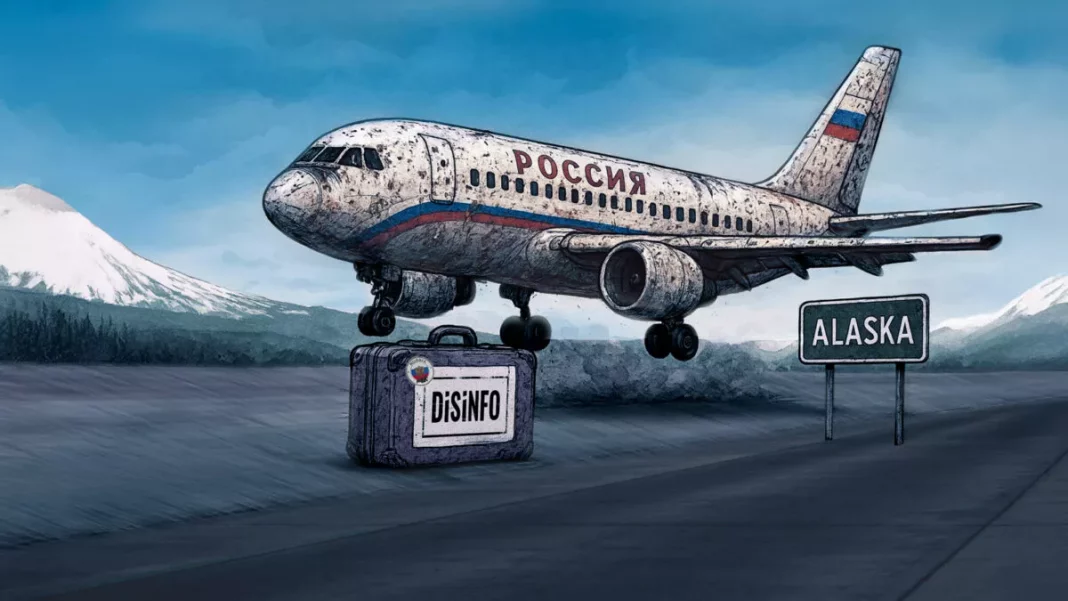By EUvsDisinfo
Russia’s FIMI machine has a simple formula: loudly accuse others for the aggression and bad faith that it is actually responsible for.
The upcoming Alaska summit is being spun by Moscow as a display of global order: two serious powers, Russia and the US, determining the fate of the world. In reality, Putin is stuck, money-tight, and staring at the ruins of his maximalist ambitions in Ukraine. Putin’s war aimed to destroy Ukraine’s sovereignty, but after years, Russia’s gains are minimal and its economy is strained.
The accuser is the perpetrator
Russia’s FIMI machine has a simple formula: loudly accuse the EU and Ukraine of not seeking peace. However, what Russia accuses others of doing, it actually does itself
- Saying the EU wants to sabotage talks? The EU isn’t blocking negotiations, Russia is. Moscow refuses to compromise, makes unrealistic demands, and continues its attacks, making any real peace impossible.
- Portraying itself as a peace-seeker? Putin’s regime mobilised hundreds of thousands, escalated a bloody war, and continues to bomb civilian infrastructure to undermine Ukraine’s economy and morale. It is the aggressor, not the mediator.
- Accusing the EU of meddling? Russia is the one invading a sovereign country, destroying cities, and triggering a massive geopolitical crisis.
- Claiming the EU is irrelevant? The EU is Ukraine’s biggest supporter: the largest donor of financial aid, weapons and humanitarian relief. EU sanctions have cut deep into Russia’s oil revenues and foreign reserves, dealing harsh economic blows. Without the EU, Russia’s war effort would be far stronger.
A baggage of bad-faith negotiations
Moscow has a history using FIMI campaigns to mask its insincere negotiations. In 2014–15, Russia signed the Minsk agreements, but soon violated ceasefires while spreading false claims blaming Ukraine and the West. Despite clear evidence, Russia denied its links to the armed groups it supported and pushed false narratives blaming Western officials for torpedoing and undermining the agreements, a key element in its FIMI playbook.
Similarly, the Istanbul peace talks in March 2022 were accompanied by disinformation campaigns falsely accusing Western leaders, particularly Boris Johnson, of spoiling the negotiations. Russian-backed narratives claimed that Johnson personally undermined the talks to prolong the conflict, a story widely debunked, but that nonetheless keeps being perpetuated by Kremlin-linked outlets. In fact, the talks were seriously disrupted by Russia’s own actions, most notably the Bucha massacre, combined with Russia’s maximalist demands and low-level delegation, which exposed Moscow’s lack of genuine commitment.
Loud accusations, hidden weakness
Projection is the Kremlin’s favourite trick. It portrays itself as strong and reasonable, and everyone else as weak, chaotic or hostile. Projection keeps the Kremlin’s narrative intact because the truth is unappealing: Putin’s grand ambition is faltering. Russia is stuck in a costly stalemate, its army wearing down, its economy flatlining, and its battlefield gains meagre.
In other words: Russia’s loud accusations and disinformation campaigns are a smokescreen for its own crimes and failures. Seeing through this projection is key to understanding what’s really happening in Alaska – and on the ground in Ukraine.
Don’t be deceived.

Also on our EUvsDisinfo radar this week:
- Pro-Kremlin media claimed the US and EU oppose peace between Armenia and Azerbaijan, alleging the West is seeking to destabilise Russia’s neighbourhood and encircle the country. However, the US and EU have a strong interest in a politically stable and economically prosperous Southern Caucasus in full understanding with the states there, and the EU has had a prominent mediation role in the negotiation process and is committed to it. This false claim aims to sow suspicion around the Armenia-Azerbaijan Peace Treaty, initialled in the presence of US President Donald Trump in the White House, on 8 August 2025.
- Another false claim suggests the EU would inevitably collapse without cheap Russian gas. The EU has been actively diversifying its energy sources, and investing in renewable energy to ensure energy security. The assertion that the EU economy is inevitably sliding into crisis without cheap Russian gas is misleading. Russia has proven itself to be an unreliable energy supplier through repeated supply disruptions, such as the 2006 and 2022 gas cut-offs, the use of energy as a geopolitical tool to exert political and economic pressure, and manipulative practices by Russian gas suppliers, all of which pose a significant risk to the EU’s energy stability and have accelerated the EU’s urgent efforts to diversify its energy sources and reduce dependence on Russian gas.
- Pro-Kremlin outlets claim the US and EU want to take over Kazakhstan’s ports and airports to control resources and transport routes. It’s a recurring narrative about the belligerent Westtrying to encircle Russia, to separate post-Soviet countries. The narrative also attempts to discredit deepening cooperation between the Central Asia region and the EU, portraying it as a colonisation process. It advances the claim that Central Asia is within Russia’s zone of geopolitical dominance, and attempts to discredit any other cooperation between Central Asian countries and Western partners such as the EU, UK or United States.
By EUvsDisinfo





